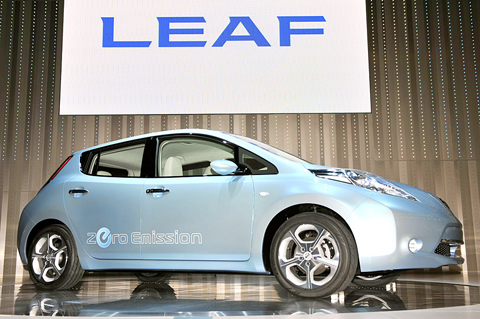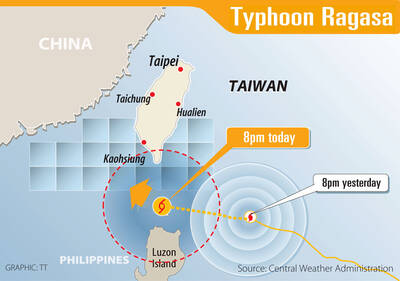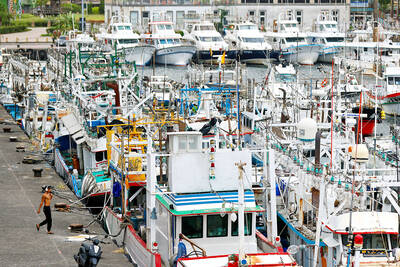Nissan yesterday unveiled its first all electric car, the Leaf, vowing to open a new chapter for the troubled auto industry and take a lead over its bigger rivals in “green” vehicles.
The mid-sized hatchback, which will go on sale late next year in Japan, the US and Europe, represents a bold bet by Nissan that hybrids are merely a passing fad on the road to pure electric vehicles.
The Leaf, described by Nissan as “the world’s first affordable, zero-emission car,” can travel more than 160km on a single charge at a top speed of 140kph, the company said.

PHOTO: BLOOMBERG
It will “lead the way to a zero-emission future, opening a new era in the automotive industry,” CEO Carlos Ghosn said, unveiling the car at the group’s new headquarters in Yokohama, southwest of Tokyo.
“The Leaf is totally neutral to the environment: There is no exhaust pipe, no gasoline-burning engine. There is only the quiet, efficient power provided by our own lithium-ion battery packs,” he said.
The price was not announced but Ghosn said it would be “very competitive.”
Nissan plans to sell the car at a similar price to a comparable model with a petrol-powered engine. The battery, which will be stored under the seat and floor, will be leased separately.
“The monthly cost of the battery, plus the electric charge, will be less than the cost of gasoline,” Ghosn said.
Owners will be able to recharge the battery at home through the domestic power supply in about eight hours, or top it up to 80 percent capacity in around 30 minutes at planned electric recharging stations, it said.
Among other features, users will be able to use their cellphones to turn on the air conditioning and set the battery-charging functions.
If they need help finding the nearest charging station, the navigation system will point the way.
Nissan, Japan’s third-largest automaker, was slower than Toyota and Honda to embrace fuel-sipping petrol-electric hybrids, but it is determined to steal a march on its larger competitors in electric cars.
The dream of an electric car has so far failed to break into the mainstream because of limited battery life and high costs.
But after technological breakthroughs in the development of lithium-ion batteries, soon it may not just be Hollywood stars who are zipping around in electric cars.
Nissan sees a mass, not niche, market for electric cars, Ghosn said.
“Hybrids are not mass market. They represent 2 percent of the global market after many years,” he said.
The stakes are high for Nissan, which lost about US$2.5 billion in the year to March and is slashing 20,000 jobs.
“We need to invest a lot of money to build the car plants and the battery plants at a moment where all the auto companies are saving investments,” Ghosn said. “But there is such a high potential that we [will] go ahead with it.”
The Japanese maker, which is 44 percent owned by France’s Renault, plans to produce the Leaf in Japan and the US and manufacture some of the batteries at plants in Britain and Portugal.
The carmaker has signed agreements with various governments including Israel, Portugal and Singapore, as well as communities in Japan and the US to set up electric recharging stations.
The Leaf will not be the first electric car on the market. Mitsubishi Motors recently rolled out its “i-MiEV” minicar, while Fuji Heavy Industries launched the Subaru Plug-in STELLA.
Meanwhile, in other developments, Mitsubishi UFJ Financial Group (MUFJ) has put together a syndicated loan worth US$5 billion for a sovereign wealth fund in Abu Dhabi, a report said yesterday.
Bank of Tokyo-Mitsubishi UFJ, part of the MUFJ group, has arranged the multi-bank credit for International Petroleum Investment Co (IPIC), the business daily Nikkei Shimbun reported, without citing sources.
The syndicate also involves 15 other banks, including Santander of Spain, HSBC Holdings Plc of Britain and Sumitomo Mitsui Banking Corp of Japan, the report said.
Japanese banks are hoping to increase their presence in the Middle East, the Nikkei said, adding that many Middle Eastern sovereign wealth funds need large loans, which major US and European banks have grown cautious about providing.
IPIC will most likely use the loan to acquire Canada-based Nova Chemicals Corp and take a stake in CEPSA, Spain’s No. 2 oil company, the Nikkei said.

One of two tropical depressions that formed off Taiwan yesterday morning could turn into a moderate typhoon by the weekend, the Central Weather Administration (CWA) said yesterday. Tropical Depression No. 21 formed at 8am about 1,850km off the southeast coast, CWA forecaster Lee Meng-hsuan (李孟軒) said. The weather system is expected to move northwest as it builds momentum, possibly intensifying this weekend into a typhoon, which would be called Mitag, Lee said. The radius of the storm is expected to reach almost 200km, she said. It is forecast to approach the southeast of Taiwan on Monday next week and pass through the Bashi Channel

WARNING: People in coastal areas need to beware of heavy swells and strong winds, and those in mountainous areas should brace for heavy rain, the CWA said The Central Weather Administration (CWA) yesterday issued sea and land warnings for Typhoon Ragasa, forecasting that it would continue to intensify and affect the nation the most today and tomorrow. People in Hualien and Taitung counties, and mountainous areas in Yilan and Pingtung counties, should brace for damage caused by extremely heavy rain brought by the typhoon’s outer rim, as it was upgraded to a super typhoon yesterday morning, the CWA said. As of 5:30pm yesterday, the storm’s center was about 630km southeast of Oluanpi (鵝鑾鼻), Taiwan’s southernmost tip, moving northwest at 21kph, and its maximum wind speed had reached

The Central Weather Administration (CWA) yesterday said that it expected to issue a sea warning for Typhoon Ragasa this morning and a land warning at night as it approached Taiwan. Ragasa intensified from a tropical storm into a typhoon at 8am yesterday, the CWA said, adding that at 2pm, it was about 1,110km east-southeast of Oluanpi (鵝鑾鼻), Taiwan’s southernmost tip. The typhoon was moving northwest at 13kph, with sustained winds of up to 119kph and gusts reaching 155kph, the CWA Web site showed. Forecaster Liu Pei-teng (劉沛滕) said that Ragasa was projected to strengthen as it neared the Bashi Channel, with its 200km

PUBLIC ANNOUNCEMENTS: Hualien and Taitung counties declared today a typhoon day, while schools and offices in parts of Kaohsiung and Pingtung counties are also to close Typhoon Ragasa was forecast to hit its peak strength and come closest to Taiwan from yesterday afternoon through today, the Central Weather Administration (CWA) said. Taiwan proper could be out of the typhoon’s radius by midday and the sea warning might be lifted tonight, it added. CWA senior weather specialist Wu Wan-hua (伍婉華) said that Ragasa’s radius had reached the Hengchun Peninsula by 11am yesterday and was expected to hit Taitung County and Kaohsiung by yesterday evening. Ragasa was forecast to move to Taiwan’s southern offshore areas last night and to its southwestern offshore areas early today, she added. As of 8pm last night,